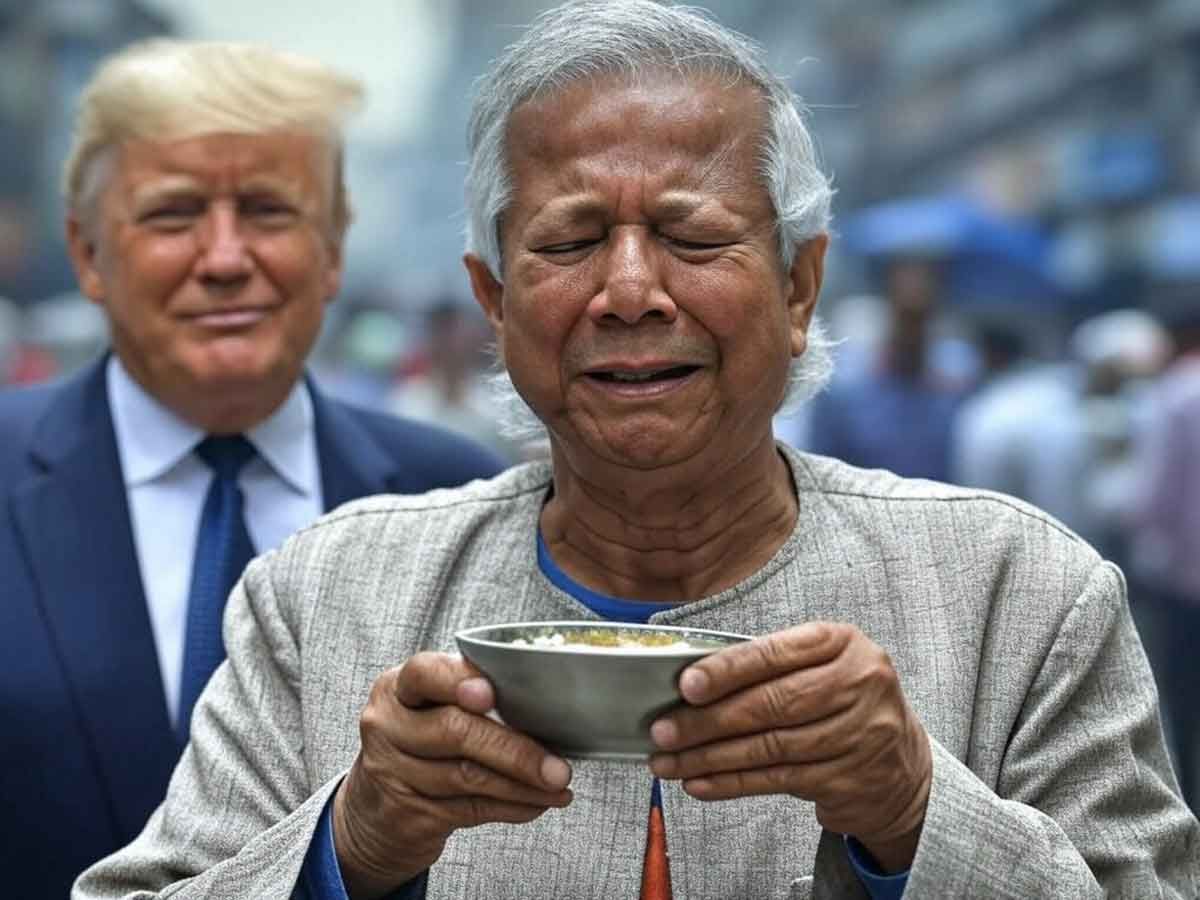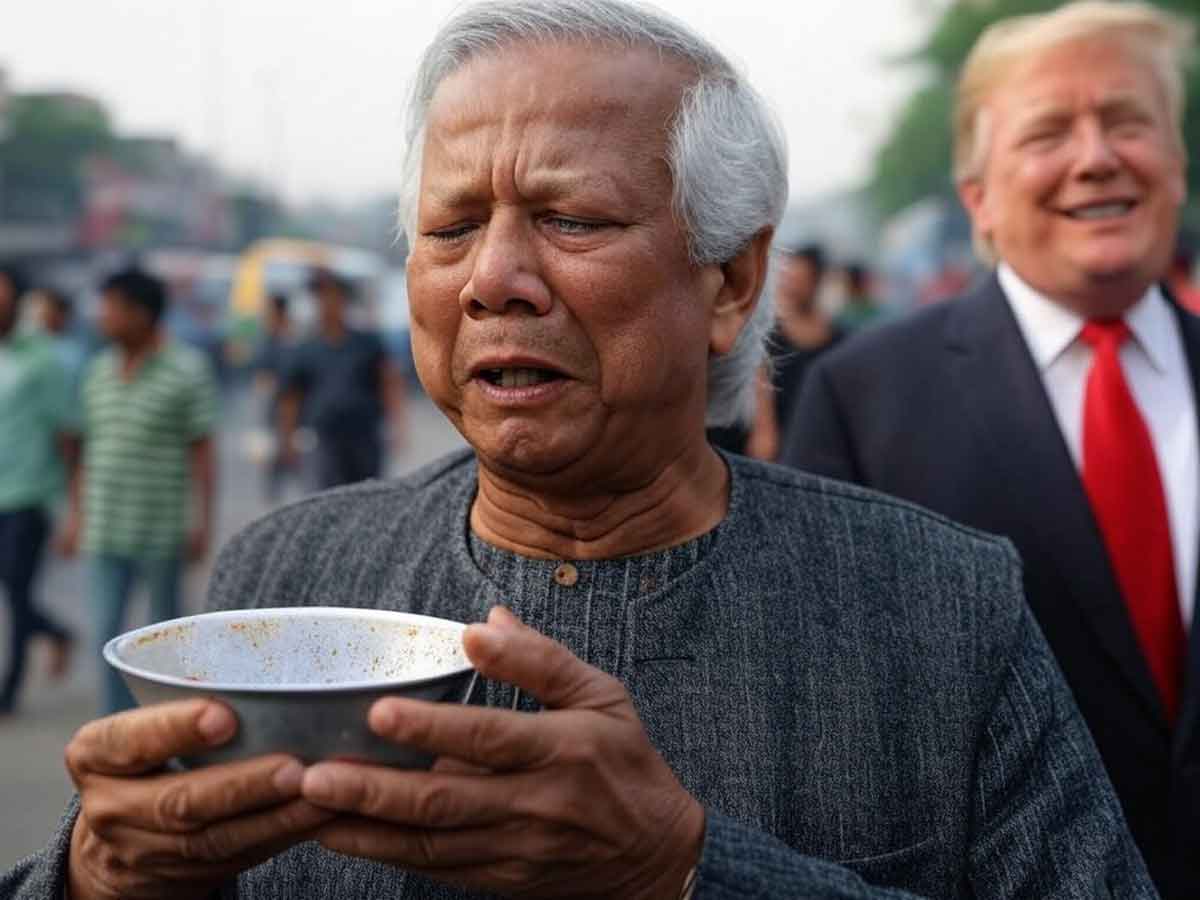MORE COVERAGE
Twitter Coverage
Satyaagrah
Written on
Satyaagrah
Written on
Satyaagrah
Written on
Satyaagrah
Written on
Satyaagrah
Written on
JOIN SATYAAGRAH SOCIAL MEDIA
"बस, अब और नहीं": President Trump’s executive order halted USAID’s $954M Bangladesh program, froze $72B global aid for 90 days, and cut Rohingya funds, leaving post-revolution Bangladesh, grappling with economic turmoil and a $5B bailout request

Within five days of taking office as the 47th President of the United States, Donald Trump issued an executive order that sent shockwaves across international aid communities. On January 25, 2025, the United States Agency for International Development (USAID) formally directed its implementing partners in Bangladesh to immediately suspend all ongoing contracts, grants, and assistance programs for a period of 90 days. This move followed the president's broader decision to halt US operations in Bangladesh, raising questions about the future of foreign aid in the region.
|
The executive order, which took effect on January 20, 2025, was part of Trump's agenda to reassess US-backed global aid programs. The State Department swiftly acted on this directive, issuing a "stop-work" order just days later. The order froze all existing foreign assistance programs and put a hold on new aid commitments under the newly mandated review. However, notable exceptions were made for Israel and Egypt, as these nations were excluded from the suspension list.
A memo, reportedly signed by Secretary of State Marco Rubio and obtained by NPR, revealed further details about the scope of this decision. It outlined that a "comprehensive review of all foreign assistance" would be conducted and completed within 85 days. The findings of this review would then be presented to the Secretary of State for consideration and recommendations to President Trump.
In line with the executive order’s objectives to "reevaluate and realign" foreign aid to better serve America's "interests and values," USAID issued a clear directive to its partners in Bangladesh. The statement required all work under its contracts and agreements to be stopped with immediate effect.
USAID’s Directive to Implementing Partners in Bangladesh
A notice shared via 𝕏 (formerly Twitter) provided specific instructions to USAID’s implementing partners in Bangladesh. The directive stated:
“The letter serves as a directive to all USAID/Bangladesh Implementing Partners to immediately stop, cease and/or suspend any work performed under your respective USAID/Bangladesh contact, task, order, grant, cooperative agreement or other acquisition or assistance instrument.”
Furthermore, the notice emphasized the need for implementing partners to act responsibly during this suspension period.
“Partners shall take all reasonable steps to minimize the incurrence of costs allocable to their awards. Partners shall not resume work under their awards until notification has been received in writing from the Contracting/Agreement Officer that this award Stop Work Order / Suspension has been cancelled.”
This decision aligns with Trump’s assertion that foreign aid provided by the US was "not aligned" with the nation's "interests and values." The halt in aid to Bangladesh is part of a broader reevaluation of US foreign policy and financial commitments overseas.
This suspension of aid has far-reaching implications, not just for Bangladesh but for the global aid structure. As stakeholders await further developments from the comprehensive review ordered by the Trump administration, questions linger about how this abrupt pause will impact ongoing development projects and the millions who depend on them.
The decision to suspend all US aid to Bangladesh under USAID has sent ripples across the nation’s political and economic landscape. The White House justified the move with a strong stance, asserting:
“The United States foreign aid industry and bureaucracy are not aligned with American interests and in many cases antithetical to American values. They serve to destabilize world peace by promoting ideas in foreign countries that are directly inverse to harmonious and stable relations internal to and among countries.”
Furthermore, it emphasized that foreign assistance must align with the President’s foreign policy:
“It is the policy of the United States that no further United States foreign assistance shall be disbursed in a manner that is not fully aligned with the foreign policy of the President of the United States.”
This directive has left the Muhammad Yunus-led government of Bangladesh grappling with the potential fallout.
|
USAID’s Vital Role in Bangladesh
USAID’s programs in Bangladesh, which form the largest aid initiative in Asia, have been pivotal in addressing critical issues. These include food security, health initiatives, and governance, alongside significant contributions to education and environmental projects. USAID has also been instrumental in Bangladesh’s humanitarian aid efforts, particularly in managing the ongoing Rohingya refugee crisis.
As the single largest donor to Bangladesh's humanitarian portfolio, the US has provided critical support in addressing the needs of millions displaced by the crisis. Since 2017, the US has contributed approximately $2.4 billion towards Rohingya-related humanitarian efforts, cementing its position as a leading ally in this domain.
|
A Fragile Economy Faces New Challenges
The suspension of US aid comes at a time when Bangladesh is already navigating a precarious financial situation. In the past year, the Yunus administration sought $5 billion in financial aid from international lenders to stabilize dwindling foreign exchange reserves. Additionally, the country requested a $4.7 billion bailout package from the International Monetary Fund (IMF) to mitigate the economic strain.
The halt in funding jeopardizes Bangladesh's ability to address these financial woes. International aid has long been a cornerstone in stabilizing the nation’s textile industry, a key economic driver, and providing relief amid its economic turmoil.
The suspension also disrupts previously established funding commitments. In September 2024, the US had pledged $202 million in aid to Bangladesh. This followed a broader USAID agreement from 2021, which allocated $954 million in aid for the period between 2021 and 2026. Of this, $425 million had already been disbursed, leaving a substantial amount now frozen under the suspension order.
|
|
Broader Implications of the ‘Stop-Work’ Order
The US State Department’s sweeping “stop-work” order on foreign aid, drafted by the Department’s foreign assistance office and signed by Secretary of State Marco Rubio, halts all non-military foreign assistance programs, with the sole exceptions of military financing for Israel and Egypt. The reasons for this abrupt directive remain undisclosed, but the order forms part of a comprehensive review of foreign aid allocations under President Trump’s administration.
This development poses a major setback for Bangladesh’s government, as it battles to manage its financial crisis while continuing critical development and humanitarian efforts. For a nation heavily reliant on international support, the suspension of aid by its largest donor underscores the fragility of its economic and social stability in the face of shifting global policies.
|
Trump Reviews US Foreign Assistance, Imposes 90-Day Moratorium
On his very first day in office, January 20, 2025, President Donald Trump issued a sweeping executive order to review all US foreign development assistance. The order placed an immediate 90-day moratorium on foreign aid disbursement to evaluate the efficiency and alignment of aid with his administration’s policy goals. However, the full scope of the review was not immediately clear, leaving many recipient countries and aid organizations uncertain about its impact.
This decision signals a potential shake-up in the global aid structure. The United States is the largest single contributor to global development assistance, allocating approximately $72 billion in foreign aid in 2023 alone. With such substantial financial contributions under review, the implications of this order are expected to reverberate widely across the world.
For Bangladesh, this development poses a significant setback. The country is already reeling from the aftermath of last year’s violent revolution that led to the overthrow of the Sheikh Hasina government. Efforts to restore stability and rebuild critical institutions have depended heavily on international aid, much of which comes from the United States.
The sudden halt in US funding threatens to derail ongoing recovery efforts. Bangladesh’s reliance on foreign assistance for essential services, infrastructure rebuilding, and humanitarian initiatives, particularly in the wake of political turmoil, underscores the gravity of this decision.
The order’s potential to cut billions of dollars in aid has sent shockwaves through aid-dependent economies and development agencies. While details of how much funding might be affected remain unclear, the mere possibility of such a substantial reduction raises concerns about the future of ongoing projects.
The review is part of Trump’s broader policy approach to ensure that US foreign assistance aligns with his administration’s priorities. The implications for global aid dynamics, particularly for vulnerable nations like Bangladesh, highlight the challenges posed by this reevaluation of foreign aid distribution.
 |
 Support Us
Support Us
Satyagraha was born from the heart of our land, with an undying aim to unveil the true essence of Bharat. It seeks to illuminate the hidden tales of our valiant freedom fighters and the rich chronicles that haven't yet sung their complete melody in the mainstream.
While platforms like NDTV and 'The Wire' effortlessly garner funds under the banner of safeguarding democracy, we at Satyagraha walk a different path. Our strength and resonance come from you. In this journey to weave a stronger Bharat, every little contribution amplifies our voice. Let's come together, contribute as you can, and champion the true spirit of our nation.
 |  |  |
| ICICI Bank of Satyaagrah | Razorpay Bank of Satyaagrah | PayPal Bank of Satyaagrah - For International Payments |
If all above doesn't work, then try the LINK below:
Please share the article on other platforms
DISCLAIMER: The author is solely responsible for the views expressed in this article. The author carries the responsibility for citing and/or licensing of images utilized within the text. The website also frequently uses non-commercial images for representational purposes only in line with the article. We are not responsible for the authenticity of such images. If some images have a copyright issue, we request the person/entity to contact us at This email address is being protected from spambots. You need JavaScript enabled to view it. and we will take the necessary actions to resolve the issue.
Related Articles
- "The nation which forgets its defenders will be itself forgotten": A nation is in trouble when its security services are raiding the home of an Ex-President, Mar-a-Lago raid over a dispute about missing official docs is a dangerous moment for America
- “We will not bend, we will not break, we will not yield, ever, ever, ever”: Defiant Donald Trump releases dramatic Political Video 'The Thunder Rolls' after FBI raid at Mar-a-Lago, he lists the failures of President Joe Biden leading a “nation in decline”
- 'In Trump I Trust': Donald Trump's Mar-a-Lago home raided, horde of angry supporters descends there in the hours following shock FBI raid of ex-president's Florida club, investigation focused on material that Trump took with him while leaving White House
- The lasting impact of Trump’s transactional diplomacy reshaped America’s global role—alliances tested, NATO questioned, deals abandoned, trade wars ignited, and a bold yet unpredictable approach that left allies uneasy and adversaries watching closely
- "Silent Peekaboo": Beneath a veil of diplomacy lies a potent quest for dominance—clear signs emerge of a US-led strategy to unseat Sheikh Hasina's government, signaling a covert regime change operation that beckons India to stand wary and watchful
- "गज़ब्बे है": Another assassination attempt on Donald Trump at his Florida golf club, with shooter Ryan Routh, a Democrat supporter who donated 19 times since 2019, targeting Trump with an AK-47; Routh also supported Tulsi Gabbard, now a Trump ally
- "Secrets and Lies": Muhammad Yunus, linked to the Clintons through $13M USAID funds, $300K donation claims, IRS threats to Sheikh Hasina's son, and loans via Clinton Foundation, faces scrutiny over his daughter Monica’s alleged role in Biden’s PCAH
- "Isn't it the sweetest mockery to mock our enemies?": German Diplomat who mocked Trump when he said Germany would “become totally dependent on Russian energy" at UN in 2018 suddenly went silent as President's 'Russian Energy' warning comes true
- "True art awakens the Extraordinary Ovation": 15 standing ovations, 79 applauses, autographs, selfies, and the whole house echoing with ‘Modi Modi slogans, Prime Minister Modi's joint address to the US Congress resonated as a resounding success
- "India created Bangladesh in 1971": In last 6 months, 79 Hindus killed, 56 temples attacked, 468 homes vandalized, 26 crores extorted, 157 Hindu families and temples looted, 620 threatened with death, 145 murder attempts, 183 injured and 32 missing
- Uncover the chilling story of Jeremy Williams, sentenced to death for the murder of 5-year-old Kamarie Holland, human trafficking & conspiring with the child's mother, who sold her daughter for $2,500, culminating in a landmark trial in Columbus, Georgia
- Haunting history- 50 years of Operation Searchlight in Dhaka
- Against a mother's hesitant heart, Abhijit's journey ends in tragedy, marking him as the 9th Indian lost in the US this year, alongside Neel Acharya, Vivek Saini, and more; their stories, a sombre echo of dreams shattered far from home, cry out for safety
- Anthony Blinken delusional about US primacy over world affairs made schoolmasterish remarks, “US monitoring human rights abuses in India”: Lutyens elites and the editors of India’s English-language media outlets lap it up
- "हिन्दू है,हिन्दू": In Bangladesh, Islamists checking a dead man's circumcision, rejoicing when confirmed as Hindu; meanwhile, actor Shanto Khan and his father, creators of a film on Sheikh Mujibur Rahman, were brutally lynched amid escalating violence

























